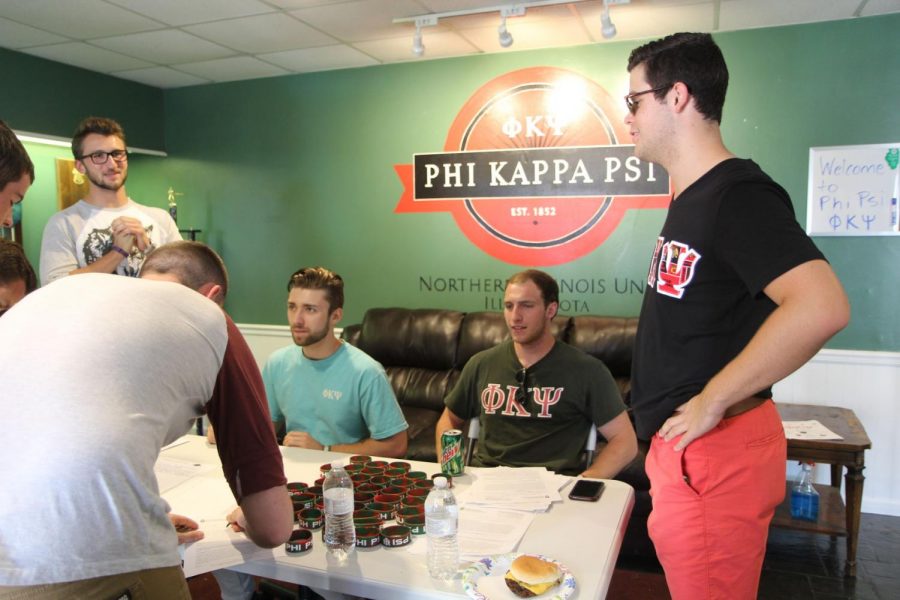Students promote anti-hazing
Members of Phi Kappa Psi sign students up to rush for the fraternity Aug. 31 at 924 Greenbrier Road.
September 8, 2016
DeKALB | Freshman Zack Higgins sends a text to his friends on the afternoon of Aug. 31 with news that he and two others were just given bids for the Delta Chi fraternity.
As Rush Week approaches, bids, an invitation to join a fraternity or sorority, are offered; potential new fraternity or sorority members attend socials during recruitment; and initiation, a ceremony where a pledge becomes a full member, seals the deal.
What occurs during initiation varies among fraternities and sororities. Steps are taken by members of Greek Life and Fraternity and Sorority Life to ensure that the night of 2012 isn’t relived.
On the night of Nov. 1, 2012, 19 pledges were questioned in the Phi Kappa Alpha fraternity house during a non-sanctioned initiation event. They were told to drink after each question, then brought to the basement where they vomited on themselves and each other and were later left unconscious on the floor throughout the house overnight.
Freshman and pledge David Bogenberger was found dead the next morning with a blood alcohol content of 0.351 percent, according to a Aug. 22, 2013, Daily Herald article.
“I didn’t know anything about it until I came here and rushed, and [members of my fraternity] talked with us about it and gave us the story,” said Trayvon Williams, recruitment chair of Phi Sigma Kappa. “We were like ‘all right, now all of these [hazing] rules are starting to make sense. Someone died from alcohol poisoning.’”
Williams said members of his fraternity inform recruits each year of the anti-hazing policy at NIU, and to explain why, they tell them the story of Bogenberger. Phi Sigma Kappa students who see signs of hazing are encouraged by their fraternity to tell a member on their fraternity’s chair, Williams said.
In the past two years, four cases of hazing out of the 300 student clubs and organizations at NIU have been reported. Of the four cases reported, none was believed by Fraternity and Sorority Life to be true incidents of hazing after investigations were conducted.
“I don’t think anyone is going to actually tell you if hazing happens,” said rushing freshman Kayla Major. “I think you need to rush and go through initiation to find the honest truth.”
If hazing does occur, students can file a report to the Student Conduct office in the Campus Life Building, Room 280. Morgan Brickley, associate director for Fraternity and Sorority Life, defines hazing as any action that could cause physical or psychological harm to an individual.
“If a student reports hazing to me, I ask them about the situation, help them submit a report to Student Conduct, and we will actually do a full-scale hazing investigation for any report of hazing that is received, for any student organization,” Brickley said.
In an attempt to prevent hazing and raise awareness, Student Involvement and Leadership Development offers new-member training to NIU’s Greek community for students who are joining a fraternity or a sorority, Brickley said.
“We talk about hazing, the definition, how to report hazing to the university,” Brickley said. “We talk about sexual assault and consent. We talk about alcohol/drug use and abuse.”
The Student Association will host National Hazing Prevention Week Sept. 19 to 23 which will include anti-hazing and courageous leadership Keynote Speaker Jordan Fischette and the promotion of social media campaign #HuskiesDontHaze.
“You can pull up Google and find that hazing is occurring in universities all across the United States, and that could be physical abuse, psychological abuse, whatever it may be,” Brickley said. “I believe that the work we’ve done in this fraternity and sorority community is leading us to a place where hazing is not occurring at NIU.”
Although training is offered to students in raising awareness and preventing hazing, whether it continues in student organizations at NIU today and goes unreported is unsure.
“If they’re not reported, there’s no way I can know,” Brickley said. “So I don’t know. I don’t have an answer.”







